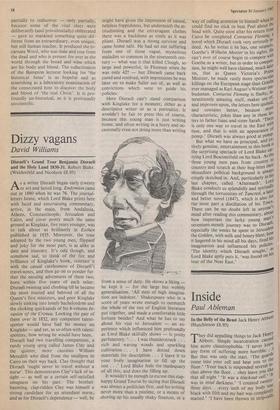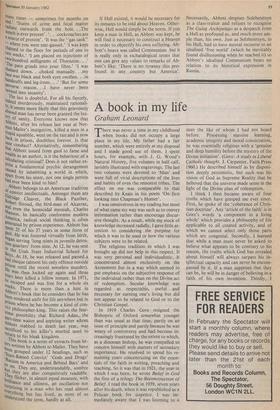Inside
Paul Ableman
In the Belly of the Beast Jack Henry Abbott (Hutchinson £6.95) They did appalling things to Jack Henry_A Abbott. Simple incarceration cause' him acute claustrophobia. 'I never knew; any form of suffering more horrible. • .1 But that was only the start. 'The guards come into your cell and beat you to III', floor.' Your back is suspended several in. ches above the floor. . .they leave you like that all night.' It was a blackout cell.' was in total darkness.' I counted twentY" three days. . .every inch of my body wasw black with filth and my hair was comPlete,4
matted.' have been thrown in strip-cells
many times — sometimes for months on end.' 'Stains of urine and fecal matter radiate outwards from the hole. . .The
stench is ever present'. . .cockroaches are a source of protein'. 'It was the "gas tank"
▪ Where you were tear-gassed.' I was kept chained to the floor for periods of one to two weeks."I am placed on injections of two-hundred milligrams of Thorazine. . The pain grinds into your fibre.' I was !Rained down. . .choked manually. . any handcuffs was black and both eyes swollen. . .in nandeuffs and leg-irons. . ."But for some
Perverse reason. . have never been tWisted into insanity'.
The last is doubtful. For all his fiercely, Indeed murderously, maintained rationali- tY, it seems more likely that this grievously abused man has never been granted the lux- ury Of sanity. Everyone knows now that Abbott, after his release last year at Nor- man Mailer's instigation, killed a man in a stupid squabble, went on the run and is now back in prison, doubtless forever. Is that sane conduct? Alternatively, remembering that Abbott issued from gaol to fame and wealth as an author, is it the behaviour of a calculating criminal? Does it not rather ex- Dress a fundamental psychic derangement caused by inhabiting a world in which, !Part from his sister, not one single person 'tad ever been kind to him? Abbott belongs to an American tradition of • convict intellectuals. Amongst them are tldridge Cleaver, the Black Panther, Robert Stroud, the bird-man of Alcatraz, andeven the homicidal messiah, Charles A Manson. In basically conformist modern America, radical social thinking is often generated by prison experience. Abbott has spent 25 of his 37 years in some form of 01. He was fostered virtually from birth, began serving 'long stints in juvenile deten- tInn quarters' from nine. At 12, he was sent t° the Utah State Industrial School for rYs. At 18, he was released and passed a 'act cheque (almost his only offence outside Prison until the recent senseless murder).
e Was then locked up again and three
be later killed a fellow inmate. In 1971, l e escaped and was free for a whole six WeLeks. There is more than a hint in Abbott's book that he considers that he has been rendered unfit for life anywhere but in I3.tison where he has become a kind of con- ,et Philosopher-king. This raises the fear- „°111e possibility Possibility that Richard Adan, the „ 1art-time waiter and aspiring writer whom Abbott stabbed to death last year, was s
return to his killer's morbid need to leturn to his bleak kingdom.
This book is a series of extracts from let- ters written by Abbott to Mailer. They have been grouped under 12 headings, such as ,State-Raised Convict' and Drugs' Racism in America and Behind Bars' and so on. 011. They are, understandably, sombre but they are also compulsively readable. Th▪ ey flicker, in almost equal measure, with .19 r aliance and silliness, an oscillation not surprising in a man who has read almost everything but has lived, as most of us understand the term, hardly at all.
If Hell existed, it would be necessary for its inmates to be told about Heaven. Other- wise, Hell would simply be the norm. If you keep a man in Hell, as Abbott was kept, he will find it necessary to construct a Heaven in order to objectify his own suffering. Ab- bott's heave was called Communism but it is really only in eschatalogical terms that one can give any values to remarks of Ab- bott's like: 'There is no tyranny this pro- found in any country but America'. Necessarily, Abbott despises Solzhenitsyn as a class-traitor and refuses to recognise The Gulag Archipelago as a despatch from a Hell as profound as, and much more am- ple than, his own. Just as Solzhenitsyn, in his Hell, had to have mental recourse to an idealised 'free world' (which he inevitably found disillusioning when he reached it) so Abbott's idealised Communism bears no relation to its historical expression in Russia.



































 Previous page
Previous page